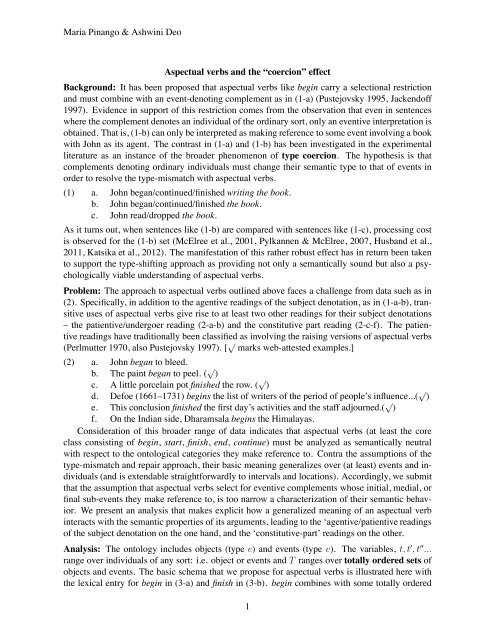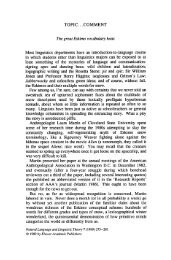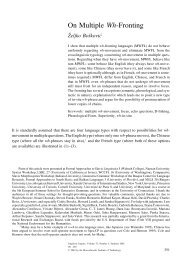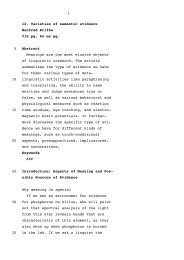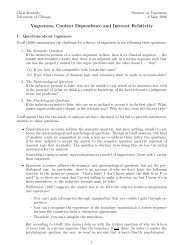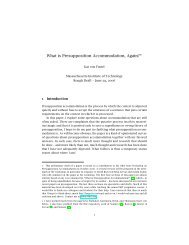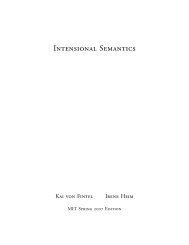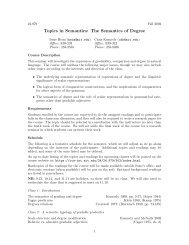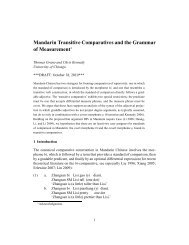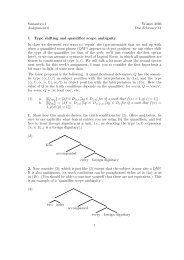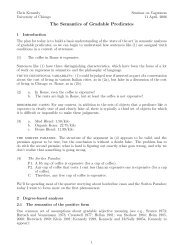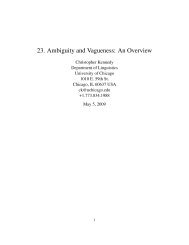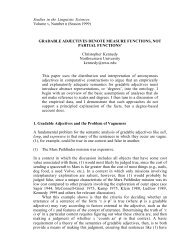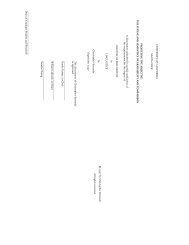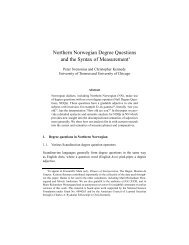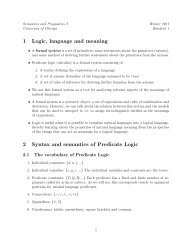On the natural history of negative polarity items - Syntax, Semantics ...
On the natural history of negative polarity items - Syntax, Semantics ...
On the natural history of negative polarity items - Syntax, Semantics ...
Create successful ePaper yourself
Turn your PDF publications into a flip-book with our unique Google optimized e-Paper software.
Maria Pinango & Ashwini Deo<br />
Aspectual verbs and <strong>the</strong> “coercion” effect<br />
Background: It has been proposed that aspectual verbs like begin carry a selectional restriction<br />
and must combine with an event-denoting complement as in (1-a) (Pustejovsky 1995, Jackend<strong>of</strong>f<br />
1997). Evidence in support <strong>of</strong> this restriction comes from <strong>the</strong> observation that even in sentences<br />
where <strong>the</strong> complement denotes an individual <strong>of</strong> <strong>the</strong> ordinary sort, only an eventive interpretation is<br />
obtained. That is, (1-b) can only be interpreted as making reference to some event involving a book<br />
with John as its agent. The contrast in (1-a) and (1-b) has been investigated in <strong>the</strong> experimental<br />
literature as an instance <strong>of</strong> <strong>the</strong> broader phenomenon <strong>of</strong> type coercion. The hypo<strong>the</strong>sis is that<br />
complements denoting ordinary individuals must change <strong>the</strong>ir semantic type to that <strong>of</strong> events in<br />
order to resolve <strong>the</strong> type-mismatch with aspectual verbs.<br />
(1) a. John began/continued/finished writing <strong>the</strong> book.<br />
b. John began/continued/finished <strong>the</strong> book.<br />
c. John read/dropped <strong>the</strong> book.<br />
As it turns out, when sentences like (1-b) are compared with sentences like (1-c), processing cost<br />
is observed for <strong>the</strong> (1-b) set (McElree et al., 2001, Pylkannen & McElree, 2007, Husband et al.,<br />
2011, Katsika et al., 2012). The manifestation <strong>of</strong> this ra<strong>the</strong>r robust effect has in return been taken<br />
to support <strong>the</strong> type-shifting approach as providing not only a semantically sound but also a psychologically<br />
viable understanding <strong>of</strong> aspectual verbs.<br />
Problem: The approach to aspectual verbs outlined above faces a challenge from data such as in<br />
(2). Specifically, in addition to <strong>the</strong> agentive readings <strong>of</strong> <strong>the</strong> subject denotation, as in (1-a-b), transitive<br />
uses <strong>of</strong> aspectual verbs give rise to at least two o<strong>the</strong>r readings for <strong>the</strong>ir subject denotations<br />
–<strong>the</strong>patientive/undergoerreading(2-a-b)and<strong>the</strong>constitutivepartreading(2-c-f). Thepatientive<br />
readings have traditionally been classified as involving <strong>the</strong> raising versions <strong>of</strong> aspectual verbs<br />
(Perlmutter 1970, also Pustejovsky 1997). [ √ marks web-attested examples.]<br />
(2) a. John began to bleed.<br />
b. The paint began to peel. ( √ )<br />
c. A little porcelain pot finished <strong>the</strong> row. ( √ )<br />
d. Defoe (1661–1731) begins <strong>the</strong> list <strong>of</strong> writers <strong>of</strong> <strong>the</strong> period <strong>of</strong> people’s influence...( √ )<br />
e. This conclusion finished <strong>the</strong> first day’s activities and <strong>the</strong> staff adjourned.( √ )<br />
f. <strong>On</strong> <strong>the</strong> Indian side, Dharamsala begins <strong>the</strong> Himalayas.<br />
Consideration <strong>of</strong> this broader range <strong>of</strong> data indicates that aspectual verbs (at least <strong>the</strong> core<br />
class consisting <strong>of</strong> begin, start, finish, end, continue) mustbeanalyzedassemanticallyneutral<br />
with respect to <strong>the</strong> ontological categories <strong>the</strong>y make reference to. Contra <strong>the</strong> assumptions <strong>of</strong> <strong>the</strong><br />
type-mismatch and repair approach, <strong>the</strong>ir basic meaning generalizes over (at least) events and individuals<br />
(and is extendable straightforwardly to intervals and locations). Accordingly, we submit<br />
that <strong>the</strong> assumption that aspectual verbs select for eventive complements whose initial, medial, or<br />
final sub-events <strong>the</strong>y make reference to, is too narrow a characterization <strong>of</strong> <strong>the</strong>ir semantic behavior.<br />
We present an analysis that makes explicit how a generalized meaning <strong>of</strong> an aspectual verb<br />
interacts with <strong>the</strong> semantic properties <strong>of</strong> its arguments, leading to <strong>the</strong> ‘agentive/patientive readings<br />
<strong>of</strong> <strong>the</strong> subject denotation on <strong>the</strong> one hand, and <strong>the</strong> ‘constitutive-part’ readings on <strong>the</strong> o<strong>the</strong>r.<br />
Analysis: The ontology includes objects (type e) andevents(typev). The variables, t, t ′ ,t ′′ ...<br />
range over individuals <strong>of</strong> any sort: i.e. object or events and T ranges over totally ordered sets <strong>of</strong><br />
objects and events. The basic schema that we propose for aspectual verbs is illustrated here with<br />
<strong>the</strong> lexical entry for begin in (3-a) and finish in (3-b). begin combines with some totally ordered<br />
1


